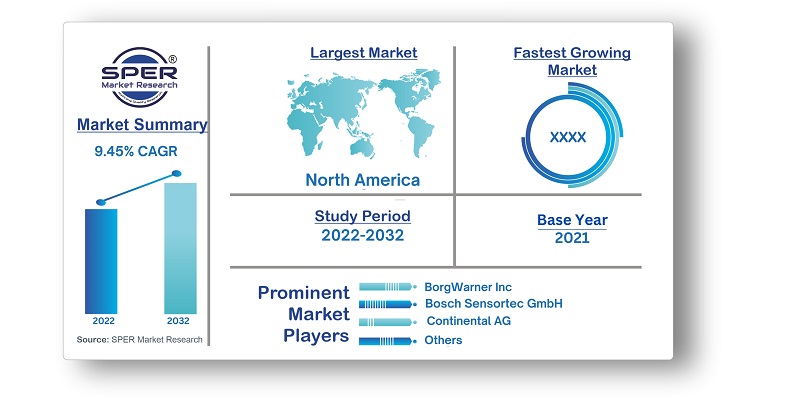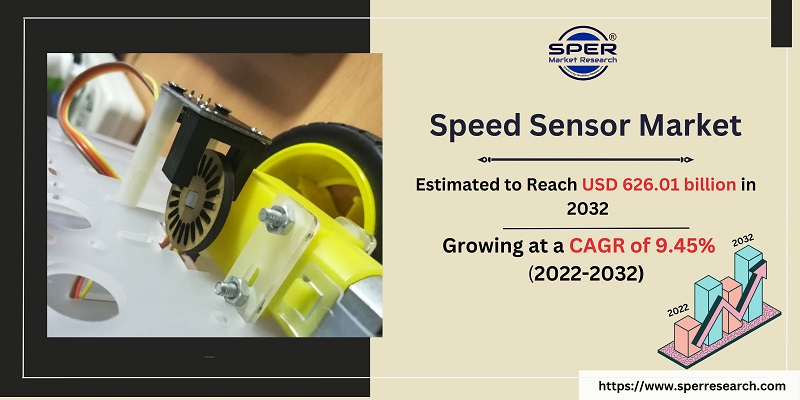
Speed Sensor Market Growth, Size, Share, Trends, Key Manufacturers, Revenue and Future Outlook
Speed Sensor Market Size- By Product, By Type, By Application, By Technology- Regional Outlook, Competitive Strategies and Segment Forecast to 2032
| Published: Mar-2023 | Report ID: SEMI2313 | Pages: 1 - 244 | Formats*: |
| Category : Semiconductor and Electronics | |||


| Report Metric | Details |
| Market size available for years | 2019-2032 |
| Base year considered | 2021 |
| Forecast period | 2022-2032 |
| Segments covered | By Product, By Type, By Application, By Technology. |
| Regions covered | Asia-Pacific, Europe, Middle East and Africa, North America, Latin America |
| Companies Covered | ABB, BorgWarner Inc., Bosch Sensortec GmbH, Continental AG, HYUNDAI MOBIS, Infineon Technologies AG, NXP Semiconductors, OMRON Corporation, Pepperl+Fuchs, Qualcomm Technologies, Inc., Robert Bosch GmbH, Rockwell Automation, Inc., Schneider Electric, Semiconductor Components Industries, LLC, Siemens, STMicroelectronics, TE Connectivity, Texas Instruments Incorporated, WABCO, ZF Friedrichshafen AG |
- Manufacturers and suppliers of speed sensors
- Automotive industry
- Aerospace and defense industry
- Consumer electronics industry
- Industrial machinery industry
- Active Sensor
- Bipolar Sensor,
- Inductive Sensor,
- Monopolar Sensor,
- Wheel Speed Sensor
- Speedometer
- LIDAR
- Ground Speed Radar
- Doppler Radar
- Pitot Tube
- Body Electronics
- Exhaust
- Powertrain
- Safety & Control
- Transmission
- Turbocharger
- Magneto-resistive
- Hall Effect
- Asia-Pacific
- Europe
- Middle East & Africa
- North America
- Latin America
- Size of Global Speed Sensor Market (FY’2019-FY’2032)
- Overview of Global Speed Sensor Market
- Segmentation of Global Speed Sensor Market By Type (Active Sensor, Bipolar Sensor, Inductive Sensor, Monopolar Sensor)
- Segmentation of Global Speed Sensor Market By Product (Wheel Speed Sensor, Speedometer, LIDAR, Ground Speed Radar, Doppler Radar, Pitot Tube)
- Segmentation of Global Speed Sensor Market By Application (Body Electronics, Exhaust, Powertrain, Safety & Control, Transmission, Turbocharger, Others)
- Segmentation of Global Speed Sensor Market By Technology (Magneto-resistive, Hall Effect)
- Statistical Snap of Global Speed Sensor Market
- Growth Analysis of Global Speed Sensor Market
- Problems and Challenges in Global Speed Sensor Market
- Competitive Landscape in the Global Speed Sensor Market
- Impact of COVID-19 and Demonetization on Global Speed Sensor Market
- Details on Recent Investment in Global Speed Sensor Market
- Competitive Analysis of Global Speed Sensor Market
- Major Players in the Global Speed Sensor Market
- SWOT Analysis of Global Speed Sensor Market
- Global Speed Sensor Market Future Outlook and Projections (FY’2019-FY’2032)
- Recommendations from Analyst
1.1. Scope of the report1.2. Market segment analysis
2.1 Research data source2.1.1 Secondary data2.1.2 Primary data2.1.3 SPER’s internal database2.1.4 Premium insight from KOL’s2.2 Market size estimation2.2.1 Top-down and Bottom-up approach2.3 Data triangulation
4.1. Driver, Restraint, Opportunity and Challenges analysis4.1.1 Drivers4.1.2 Restraints4.1.3 Opportunities4.1.4 Challenges4.2. COVID-19 Impacts of the Global Speed Sensor Market
5.1. SWOT analysis5.1.1 Strengths5.1.2 Weaknesses5.1.3 Opportunities5.1.4 Threats5.2. PESTEL analysis5.2.1 Political landscape5.2.2 Economic landscape5.2.3 Social landscape5.2.4 Technological landscape5.2.5 Environmental landscape5.2.6 Legal landscape5.3. PORTER’S five forces analysis5.3.1 Bargaining power of suppliers5.3.2 Bargaining power of Buyers5.3.3 Threat of Substitute5.3.4 Threat of new entrant5.3.5 Competitive rivalry5.4.Heat map analysis
6.1 Global Speed Sensor Manufacturing Base Distribution, Sales Area, Product Type6.2 Mergers & Acquisitions, Partnerships, Product Launch, and Collaboration in Global Speed Sensor Market
7.1 Active Sensor7.2 Bipolar Sensor,7.3 Inductive Sensor,7.4 Monopolar Sensor,
8.1 Wheel Speed Sensor8.2 Speedometer8.3 LIDAR8.4 Ground Speed Radar8.5 Doppler Radar8.6 Pitot Tube
9.1 Body Electronics9.2 Exhaust9.3 Powertrain9.4 Safety & Control9.5 Transmission9.6 Turbocharger9.7 Others
10.1 Magneto-resistive10.2 Hall Effect
11.1 Global Speed Sensor Market Size and Market Share by Region (2019-2025)11.2 Global Speed Sensor Market Size and Market Share by Region (2026-2032)11.3 Asia-Pacific11.3.1 Australia11.3.2 China11.3.3 India11.3.4 Japan11.3.5 South Korea11.3.6 Rest of Asia-Pacific11.4 Europe11.4.1 France11.4.2 Germany11.4.3 Italy11.4.4 Spain11.4.5 United Kingdom11.4.6 Rest of Europe11.5 Middle East and Africa11.5.1 Kingdom of Saudi Arabia11.5.2 United Arab Emirates11.5.3 Rest of Middle East & Africa11.6 North America11.6.1 Canada11.6.2 Mexico11.6.3 United States11.7 Latin America11.7.1 Argentina11.7.2 Brazil11.7.3 Rest of Latin America
12.1 ABB12.1.1 Company details12.1.2 Financial outlook12.1.3 Product summary12.1.4 Recent developments12.2 BorgWarner Inc12.2.1 Company details12.2.2 Financial outlook12.2.3 Product summary12.2.4 Recent developments12.3 Bosch Sensortec GmbH12.3.1 Company details12.3.2 Financial outlook12.3.3 Product summary12.3.4 Recent developments12.4 Continental AG12.4.1 Company details12.4.2 Financial outlook12.4.3 Product summary12.4.4 Recent developments12.5 HYUNDAI MOBIS12.5.1 Company details12.5.2 Financial outlook12.5.3 Product summary12.5.4 Recent developments12.6 Infineon Technologies AG12.6.1 Company details12.6.2 Financial outlook12.6.3 Product summary12.6.4 Recent developments12.7 NXP Semiconductors12.7.1 Company details12.7.2 Financial outlook12.7.3 Product summary12.7.4 Recent developments12.8 OMORON Corporation12.8.1 Company details12.8.2 Financial outlook12.8.3 Product summary12.8.4 Recent developments12.9 Pepperl+ Fuchs12.9.1 Company details12.9.2 Financial outlook12.9.3 Product summary12.9.4 Recent developments12.10 Qualcomm Technologies, Inc12.10.1 Company details12.10.2 Financial outlook12.10.3 Product summary12.10.4 Recent developments12.11 Robert Bosch GmbH12.11.1 Company details12.11.2 Financial outlook12.11.3 Product summary12.11.4 Recent development12.12 Rockwell Automation Inc.12.12.1 Company details12.12.2 Financial outlook12.12.3 Product summary12.12.4 Recent developments12.13 Schneider Electric12.13.1 Company details12.13.2 Financial outlook12.13.3 Product summary12.13.4 Recent developments12.14 Semiconductor Components Industries, LLC12.14.1 Company details12.14.2 Financial outlook12.14.3 Product summary12.14.4 Recent developments12.15 Siemens12.15.1 Company details12.15.2 Financial outlook12.15.3 Product summary12.15.4 Recent developments312.16 STMicroelectronics12.16.1 Company details12.16.2 Financial outlook12.16.3 Product summary12.16.4 Recent developments12.17 TE Connectivity12.17.1 Company details12.17.2 Financial outlook12.17.3 Product summary12.17.4 Recent developments12.18 Texas Instruments Incorporated12.18.1 Company details12.18.2 Financial outlook12.18.3 Product summary12.18.4 Recent developments12.19 WABCO12.19.1 Company details12.19.2 Financial outlook12.19.3 Product summary12.19.4 Recent developments12.20 ZF Friedrichshafen AG12.20.1 Company details12.20.2 Financial outlook12.20.3 Product summary12.20.4 Recent developments
SPER Market Research’s methodology uses great emphasis on primary research to ensure that the market intelligence insights are up to date, reliable and accurate. Primary interviews are done with players involved in each phase of a supply chain to analyze the market forecasting. The secondary research method is used to help you fully understand how the future markets and the spending patterns look likes.
The report is based on in-depth qualitative and quantitative analysis of the Product Market. The quantitative analysis involves the application of various projection and sampling techniques. The qualitative analysis involves primary interviews, surveys, and vendor briefings. The data gathered as a result of these processes are validated through experts opinion. Our research methodology entails an ideal mixture of primary and secondary initiatives.



Frequently Asked Questions About This Report
PLACE AN ORDER
Year End Discount
Sample Report
Pre-Purchase Inquiry
NEED CUSTOMIZATION?
Request CustomizationCALL OR EMAIL US
100% Secure Payment






Related Reports
Our Global Clients
Our data-driven insights have influenced the strategy of 200+ reputed companies across the globe.




















